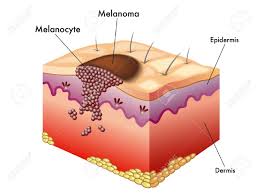“[t]he study of synergistic relationships between melatonin analogues and (melanoma) anticancer drugs is a promising field, and these compounds could significantly strengthen the cytostatic and the cytotoxic effects triggered by conventional antineoplastic drugs…”

Melanoma is an aggressive cancer with a miserable five-year survival rate, that is if you only pursue the conventional oncology playbook. The three studies linked and excerpted below explain that:
- melatonin is an anti-melanoma therapy and
- melatonin protects against a side effect called chemotherapy-induced peripheral neuropathy
I’m not saying that melatonin is a silver bullet cure for melanoma patients. I’m saying that my experience as a survivor of an incurable cancer and cancer coach has been for cancer patients and survivors to pursue the entire spectrum of evidence-based therapies.
According to the top study excerpted below “Thus, adding melatonin to chemo- and radiotherapy may have synergistic therapeutic effects and increase the survival time in patients with skin cancer.”
This means that melanoma patients should consider taking an integrative approach to their treatment- consider combining both conventional as well as evidence-based non-conventional therapies.
Have you been diagnosed with melanoma? What stage? Please scroll down the page, post a question or comment and I will reply to you ASAP.
Thank you,
David Emerson
- Cancer Survivor
- Cancer Coach
- Director PeopleBeatingCancer
“Skin cancer, particularly melanoma, is a leading cause of death worldwide. The therapeutic methods for this malignancy are not effective, and due to the side effects of these treatments, applying an appropriate alternative or complementary treatment is important.
According to available data, melatonin as the main product of the pineal gland has oncostatic and antitumoral properties. Also, melatonin acts as an anti-inflammatory and reactive oxygen species inducer agent which suppresses the growth of tumors.
It also has apoptosis induction characteristics through regulating signaling pathways, including heat shock protein 70, nuclear factor-erythroid 2 p45-related factor 2 and others.
Thus, adding melatonin to chemo- and radiotherapy may have synergistic therapeutic effects and increase the survival time in patients with skin cancer.
Few clinical studies have evaluated the efficacy of melatonin in skin cancer. Based on the related mechanisms, this review discusses about how melatonin may improve outcomes in skin cancer patients.”
“We undertook a study to investigate the therapeutic potential of orally administered melatonin in patients with advanced melanoma. Forty-two patients received melatonin in doses ranging from 5 mg/m2/day to 700 mg/m2/day in four divided doses…
After a median follow-up of 5 weeks:
- six patients had partial responses, (14%)
- six additional patients had stable disease (14%)
Sites of response included the central nervous system, subcutaneous tissue and lung. The median response duration was 33 weeks for the partial responders. There was a suggestion of a dose-response relationship. The toxicity encountered was minimal and consisted primarily of fatigue in 17 of 40 patients.
Melatonin also appeared to reduce basal levels of follicle-stimulating hormone (FSH). No significant changes were encountered in serum levels of luteinizing hormone (LH) or thyroid stimulating hormone (TSH)…
“Melatonin derivatives may have antitumorigenic effects against melanoma and breast cancer cells…
Previous studies have demonstrated that melatonin and its analogues, in addition to their ability to regulate circadian rhythms, may exhibit cytotoxic activity via various cellular mechanisms. For this study, researchers investigated the in vitro and in vivo effects of melatonin derivatives on cancer cells…
The authors concluded, “[t]he study of synergistic relationships between melatonin analogues and anticancer drugs is a promising field, and these compounds could significantly strengthen the cytostatic and the cytotoxic effects triggered by conventional antineoplastic drugs…”
“Melatonin is therefore a potential treatment to limit the development of painful neuropathy resulting from chemotherapy treatment…”
APPIP ERROR: amazonproducts[
AccessDeniedAwsUsers|The Access Key Id AKIAJAJ37JVNL7OUU4CA is not enabled for accessing this version of Product Advertising API. Please migrate your credentials as referred here https://webservices.amazon.com/paapi5/documentation/migrating-your-product-advertising-api-account-from-your-aws-account.html.
]




